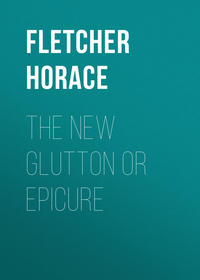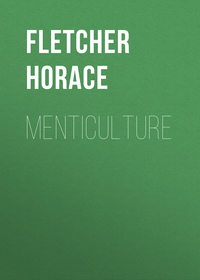 полная версия
полная версияFletcherism
To make my ideas a little clearer, I will elaborate them a little more. Remember that the rules are exceedingly simple. That, to my mind, is the worst obstruction to the general adoption of my system: it is so simple that many find it difficult to comprehend. But take these rules and you have the idea.
FIRST RULEDon't take any food until you are "good and hungry."
Some people will reply: "I am always hungry." Others will aver that they "never know what it is to be hungry." We may assume that both replies are incorrect, because hunger must be intermittent, and must sometimes be present, or life would be intolerable through lack of satisfaction and something to satisfy.
The question, "What is hunger?" is a natural and legitimate one, for the reason that there are true appetites and false cravings. True hunger for food is indicated by "watering of the mouth" – not that watering of the mouth, or profuse flow of saliva, through artificial excitement by some pungent stimulant, such as sweets, or acids or spiced things; but that which is excited on thought of some of the simplest of foods, such as bread and butter, or dry bread alone.
"All-goneness" in the region of the stomach, "faintness," or any of the discomforts that are felt below the guillotine line, are not signs of true hunger, but symptoms of indigestion, or some other form of disease. True hunger is never a discomfort unless a growing desire may be classed as a discomfort. Accumulating appetite (true hunger) is like the multiplication of uncut and uncashed coupons on a railway bond or on a Government bond. The feeling of possession is a joy of itself; and the ability to collect the proceeds when needed and at leisure is comfortable rather than uncomfortable. Under circumstances of intelligent nutrition, if we pass one meal-time we wait patiently for the next, with the knowledge that we are accumulating appetite coupons.
SECOND RULEHave you yet learned what true hunger is?
Don't go on unless you have done so. Take a little more time; skip a meal or two, and give Nature a chance to show you what real appetite (true watering of the mouth) is. Having learned to recognise healthy hunger and appetite, and to know what it is to have both of them begging you for satisfaction, proceed with the second rule.
From the food available at the time take that first which appeals most strongly to the appetite. It may be a sip of soup, or a bite of bread and butter, or a nibble of cheese, or, perhaps a lump of sugar. It may be a piece of meat, though I doubt that a true appetite will call for such at the beginning of a meal. Never mind what it may be, give it a trial. If it be something that should be masticated in order to give the saliva a chance to mix with it and chemically transform it, chew it "for all that it is worth."
"For all that it is worth" means for the extraction and enjoyment of all the good taste there is in it.
If the food selected by the appetite happens to be soup, or milk, or some mushy substance, get all the good taste out of it, doing all you can to accomplish this; for to get the taste out of food is an assurance of digesting it, and the pleasure it gives in the process of Nature's way of getting you to do the right thing in helping her to nourish yourself properly. Sip, taste, bite, press with the tongue against the roof of the mouth, the food in the mouth, not because of any suggestion of mine, but in response to the natural instinct to move it about and get out of it all the taste there is in it.
THIRD RULEThe moment appetite begins to slack up a bit, the moment saliva does not flow so freely as at first, the moment there is any degree of satisfaction of the appetite, stop eating!
You will have a return of appetite; you will have another chance to eat; appetite is beginning to have "that tired feeling" herself; be kind to her as she has been kind to you. Give her a rest! Give her a rest! Give yourself a rest! Rest is the antidote of "that tired feeling"! Therefore rest the appetite before it gets tired. Stop eating before you are overloaded.
Now, having learned how to do the right thing in eating so as never more to have "that tired feeling," don't begin to overdo. Don't bend backward too far. Don't ever overdo a good thing.
Be temperate; be deliberate. Be thoughtful; be forethoughtful; be forethoughtful without being fearthoughtful. Don't overdo chewing, for then you take away much of the pleasure; smother the psychic enjoyment of eating, and raise the very mischief again.
Just be natural, and know that being natural is being deliberate in enjoying the thing you are doing, for that is Nature's way.
To the above simple rules I will append a few recommendations which occurred to me and which I wrote while in a respiration calorimeter, an experience which I will relate in a subsequent chapter. This list of recommendations has since been included in the Instructions to the Medical Department of the United States Army, under the heading:
Method of attaining Economic Assimilation of Nutriment and Immunity from Disease, Muscular Soreness and Fatigue(1) Feed only when a distinct appetite has been earned.
(2) Masticate all solid food until it is completely liquefied and excites in an irresistible manner the swallowing reflex or swallowing impulse.
(3) Attention to the act and appreciation of the taste are necessary, meantime, to excite the flow of gastric juice into the stomach to meet the food – as demonstrated by Pawlow.
(4) Strict attention to these two particulars will fulfil the requirements of Nature relative to the preparation of the food for digestion and assimilation; and this being faithfully done, the automatic processes of digestion and assimilation will proceed most profitably, and will result in discarding very little digestion-ash (fæces) to encumber the intestines, or to compel excessive draft upon the body energy for excretion.
(5) The assurance of healthy economy is observed in the small amount of excreta and its peculiar inoffensive character, showing escape from putrid bacterial decomposition such as brings indol and skatol offensively into evidence.
(6) When digestion and assimilation has been normally economic, the digestion-ash (fæces) may be formed into little balls ranging in size from a pea to a so-called Queen Olive, according to the food taken, and should be quite dry, having only the odour of moist clay or of a hot biscuit. This inoffensive character remains indefinitely until the ash completely dries, or disintegrates like rotten stone or wood.
(7) The weight of the digestive-ash may range (moist) from 10 grams to not more than 40-50 grams a day, according to the food; the latter estimate being based on a vegetarian diet, and may not call for excretion for several days; smallness indicating best condition. Foods differ so materially that the amount and character of the excreta cannot be accurately specified. Some foods and conditions demand two evacuations daily. Thorough and faithful Fletcherizing settles the question satisfactorily.
(8) Fruits may hasten peristalsis7; but not if they are treated in the mouth as sapid liquids rather than as solids, and are insalivated, sipped, tasted, into absorption in the same way wine-tasters test and take wine, and tea-tasters test tea. The latter spit out the tea after tasting, as, otherwise, it vitiates their taste, and ruins them for their discriminating profession.
(9) Milk, soups, wines, beer, and all sapid liquids or semi-solids should be treated in this manner for the best assimilation and digestion as well as for the best gustatory results.
(10) This would seem to entail a great deal of care and bother, and lead to a waste of time.
(11) Such, however, is not the case. To give attention in the beginning does require strict attention and persistent care to overcome life-long habits of nervous haste; but if the attack is earnest, habits of careful mouth treatment and appetite discrimination soon become fixed, and cause deliberation in taking food unconsciously to the feeder.
(12) Food of a proteid value of 5-7 grams of nitrogen and 1,500-2,500 calories of fuel value,8 paying strict attention to the appetite for selection and carefully treated in the mouth, has been found to be the quantity best suited to economy and efficiency of both mind and body in sedentary pursuits and ordinary business activity; and, also, such habit of economy has given practical immunity from the common diseases for a period extending over more than fifteen years, whereas the same subject was formerly subject to periodical illness. Similar economy and immunity have shown themselves consistently in the cases of many test subjects covering periods of ten years, and applies equally to both sexes, all ages, and other idiosyncratic conditions.
(13) The time necessary for satisfying complete body needs and appetite daily, when the habit of attention, appreciation and deliberation have been installed, is less than half an hour, no matter how divided as to number of rations. This necessitates industry of mastication, to be sure, and will not admit of waste of much time between mouthfuls.
(14) Ten or fifteen minutes will completely satisfy a ravenous appetite if all conditions of ingestion and preparation are favourable.
(15) Both quantitive and qualitive supply of saliva are important factors; but attention to these fundamental requirements of right eating soon regulates the supply of all of the digestive juices, and in connection with the care recommended above, ensures economy of nutrition and, probably, immunity from disease.
CHAPTER V
WHAT IS PROPER MASTICATION?Not Excessive Chewing – Gladstone's Advice – Salival Action on Starch Foods
Notwithstanding the fact that Fletcherizing stands for tasting as the important thing to accomplish before food is swallowed, and that biting, chewing, or masticating is merely a means to secure the end of thorough tasting, nine-tenths of all who know anything about the claims for Fletcherizing insist on thinking that it merely means "excessive mastication." The National Food Reform Association of England, in a bulletin giving advice concerning the feeding of school children, intended to be posted in school-rooms and private dining rooms, speak of Fletcherizing in its ideal practice as "Excessive Mastication."
This is just what Fletcherizing is not. The very essence of the method of performing the personal responsibility is avoiding excess of anything, excessive or laboured chewing among the rest.
There is little if any harm in keeping food in the mouth as long as possible, and I believe that it is impossible to have too much saliva mixed with it when it is swallowed, because when it is properly tasted and insalivated it is almost impossible to hold it back from the food gate at the back of the mouth. There is always suction there ready to draw welcome nourishment in when it is ready, and readiness touches a button, electrically relieving the muscular springs that close the gate tightly during tasting, and, literally a "team of horses could not hold it."
What the mystics of the stomach-diseases profession called bradefagy, or, in plain English, excessive chewing, can only be performed with painful tediousness. It makes work – hard work – of the act, and that is just as much opposed to Fletcherizing as it is to common sense, horse sense, and all of the natural senses.
Now just for one moment please pay attention to one who is telling you something Mother Nature wants you to know more than anything else in the whole category of intelligence. Fletcherizing is
NOT EXCESSIVE CHEWINGor tedious chewing, or long chewing. The things that require to be chewed long are not good food, and by that sign you may find out their unprofitableness better than in any other way. Good taste from good food is not long lasting. When the mouth is "watering" for the food in sight, or even in thought of it, the coupons of taste they carry with them are short, but represent large figures of satisfaction and nourishment.
MR. GLADSTONE'S ADVICENow listen to some figures regarding the number of bites or chews that some foods require under varying circumstances. Mr. Gladstone's advice to his children which has become classic, viz.: "Chew your food thirty-two times at least, so as to give each of your thirty-two teeth a chance at it," was a general recommendation. Mr. Gladstone was observed once when he was a guest at "high table" at Trinity College, Cambridge, and the average number of his "bites" (masticatory movements) as far as they could be counted, was about seventy-five. That did not speak very well for Trinity fare, unless Mr. Gladstone happened to choose food that required that amount of chewing.
Even if Mr. Gladstone did devote seventy-five masticatory movements to each morsel, as an average, such thoroughness would not have involved an unusual length of time for a hearty meal. If you will try the experiment when you are "good and hungry," having a "working-man's appetite," and disposing of good bread and butter the while, which should have nearly, or quite, seventy bites to the ordinary mouthful, you will find that thirty mouthfuls will pretty nearly, or completely, satisfy your working-man's appetite. Mixed foods take much less time, usually about half, and still the seventy-five-rhythm act will consume only about twenty minutes to perform with physiologic thoroughness.
SALIVAL ACTION ON STARCH FOODSHere are some statements easy to prove or disprove by anyone, with real compensation in the way of new revelations relative to the possibilities of gustatory enjoyment.
Starchy foods, such as bread, potatoes, etc., require from thirty to seventy masticatory movements to assist saliva to turn the starch into "grape sugar," which is the form in which it can be used as nourishment.9
You will at once think, no doubt, that a range of numbers extending from thirty to seventy is pretty wide. So it is; but conditions regarding the qualities of not only breads, but potatoes, and also conditions relative to the strength or supply of saliva, differ greatly. When the appetite is keen, the mouth watering, as they are at the beginning of a meal, bread or potatoes may be negotiated into nutriment ready for the stomach in much less time than later on. Appetite "peters," as miners say, gradually, and does not stop with a bang and shut off like an electric light when connection is broken. It checks up, slows down, and tapers off gradually, and that is where the canny intelligence of a faithful Fletcherizer stands himself in good usefulness. When Appetite gently says: "Now, really, you are still rather good to my assistant Taste, and he would not object to a few bites more; but if you stop now and change off to something else which I have in mind, and for which I have a use in our organism, I will not object." In plain words: "I have enough for the present; switch off on to – "
The difference between putting on fat in the case of the person who is disposed or permitted to put on more fat than is comfortable, and losing some of the surplus carried on the abdomen or elsewhere, is the discrimination exercised in regard to the final satisfaction of appetite. Those last two, three, or a few mouthfuls after Appetite has said gently "Enough," and before the same Appetite says, loudly, "Stop!" are the difference between obesity and decency of form.
I really believe, from the results of my experiences for the past fifteen years in getting tips from Mother Nature, and trying to induce mankind in general and my friends in particular to accept them as "straight" from Mother Nature, that persons who have enough respect for themselves to be interested in physical culture must come to the rescue of the pseudo-scientists who are dulled by their own dope, and who are suffering from the malaria which collects in the dark ruts they are following in the tortuous complications of the alimentary canal. The physical culturists must build models of normality for the scientists to study.
When giving information as to what happens in the mouth, and as to what happens as a result of proper head digestion, I feel as if I am sitting on the upper lip of Mother Nature herself, and entrusting her messages to the current of her own sweet breath for distribution among her human children.
CHAPTER VI
WHAT IS HEAD DIGESTION?My Study of the Subject – The Mouth as a Digestive Organ – Dr. Cannon's Researches – Pawlow's Proofs
In the latest comprehensive treatise on human nutrition, under the title of "Food and the Principles of Dietetics," by Dr. Robert Hutchinson, of London, more than six hundred pages are devoted to the subject. Of these, just fifty lines are given to "Mouth Digestion." In a footnote of sixty-four words Dr. Hutchinson has stated the case of the importance of careful eating, with admission of a fact that would mean emancipation from most of the human disabilities if it were repeated in nurseries and primary schools as religiously as are the ordinary rules of "polite conduct," and held by Society to be the basis of respectability, which it really is.
When I first took up the study of dietetics in academic circles, nearly fifteen years ago, physiologists did not concede that there was any mouth digestion at all. Putting food in the mouth was for the purpose of mixing it with saliva so that it could be formed into a "bolus" for convenient swallowing. Now it is recognised that there is some mouth digestion. In the meantime Pawlow10 has demonstrated that the psychic influence has much to do with digestion. Cannon, also, has shown by the evidence of the Röntgen rays that mental states retard and even stop entirely the digestive processes that are going on in the stomach, and has asserted, as has also Pawlow, that the stomach digestive juices flow in response to the reports and stimulation of taste, pouring out into the cavity of the stomach juices appropriate for the digestion of the particular food being tasted, in advance of its arrival in the stomach.
This evidence, confirming my own secured by concentrated and unremitting study of the effect of head digestion on health and recuperative reconstruction, is proof enough that there is an important department of nutrition that can be properly called head digestion.
MY STUDY OF THE SUBJECTbegan with the tip from Mother Logic – that the full extent of the personal responsibility in nutrition is located in the head before the food is swallowed. That is what led me to concentrate on the mouth as the field of our responsibility which had been neglected by Science. Even the Dental Profession as a whole had not at that time "tumbled" to the fact that they were occupied professionally and constantly in a field of "Preventive Medicine" as important as now they find it.
Everybody had supposed that the digestion of food was effected only in the stomach and small intestines. This may be true, in a narrow sense, but it can be arrested and completely stopped by the head. Furthermore, digestion can be as much assisted by favourable head influence as it can be obstructed by unfavourable head treatment.
This being so, as everybody knows, or can easily learn, what follows as a logical sequence?
Here is a physiological eye-opener, as it dawns upon the business physiologist. The obvious inference is that if the head can make digestion easy or stop it altogether, the stomach being a subservient, mechanical, and chemical servant of the head in the matter, we may properly declare that the master-key of digestion is held by the head, and we may safely say that there is Head Digestion.
THE MOUTH AS A DIGESTIVE ORGANThe logical continuation of the search for the location of responsibility for good or poor digestion leads us to consider the question of "Division of Labour" as apportioned by the Laws of Normality. All the laboratory evidence I have seen confirms my own observations of the past fifteen years that Nature assures good results if we are thoroughly faithful to our head responsibility during the treatment of food up to the point of swallowing. From that time digestion has been rendered so easy by thorough mouth preparation that it may proceed smoothly even if the mental states are not pleasant. Here, too, we discover that easy digestion reacts favourably on the mentality and exerts a calming influence.
Some observers declare that idiots digest their food quite easily. The less mental clarity they possess the better for their metabolism. This does not argue in favour of the absence of mental influence, for the idiot is a sensualist, and in the relief from mental excitement finds enjoyment of taste and the satisfaction of appetite as agreeable as do the animals under similar favourable conditions.
Quite recently, when I was personally under observation by Dr. Professor Zuntz in Berlin, to test the ease of my digestion of food as compared with others who paid less attention to mouth treatment of it, the good professor instructed me to "be as nearly like a little animal as possible, thinking nothing of anything." This isn't as easy for a "live-wire thinking outfit" as for an idiot, or as for an ingenuous little animal having no thought for the morrow, but the business physiologist does not scorn to go anywhere for light on Nature's requirements. One thing is sure, the person who has been faithful to his personal responsibility by starting the process of digestion as Nature demands can relax and enjoy metabolic and mental calm in delightful harmony more easily than one who has gluttony on his conscience and the wages of sinning on his stomach. These wages look big to the swollen greed of cultivated gluttony, but they are as bad as they are big, and the best way to be convinced of this fundamentally important fact is to realise the potency of head digestion for well or ill, and give it a practical trial.
The key to good digestion is in the head, and the sooner mankind comes to realise this important truth the quicker will come the millennium of nutrition normality.
DR. CANNON'S RESEARCHESI have just been reading Professor Walter B. Cannon's book in the Arnold Medical Monograph Series, entitled "The Mechanical Factors of Digestion." I have learned many valuable lessons from the intestinal observations of Dr. Cannon, and have seen the shadows he describes on his fluorescent screen under his practised guidance, and, with his generous permission, quoted him extensively in my book, The A. B. – Z. of Our Own Nutrition.
It seems that we began our quest for light on the mechanics and mentality of digestion by objective observation about the same year, 1898. He took a hop, skip and jump over the three inches of the alimentary canal that is our personal responsibility and, with the aid of bismuth blackened food and a Röntgen-ray apparatus, began to study the movements incident to digestion by the shadows cast on the screen. For this purpose he principally used female cats, because they were more amenable than male cats to the torture of being tied flat to a cloth with the possible fear that they were condemned to death as well as to inactivity. Even the use of pink or blue ribbons as bands of bondage under the circumstances does not lure their cat-ladyships into the quietude demanded for normal movements of digestion, and male cats will not "stand for it" at all.
For ten years or more Professor Cannon and his assistants were devoted to these Dark Chamber X-ray observations, and in the meantime wading through hundreds of volumes of Physiological Archives for reports of other intestinal investigations. The fruit of this thoroughness of research is more than 400 references to reported data and conclusions extending back to the dawn of Physiology. To one who has followed the accounts of the "Diddings" in the "Old Man Greenlaw's Liquor Saloon in Arkansas City," as given weekly in the New York Sunday Sun, these researches seem to be governed by the strict rules of "Draw Poker." Eventually all of the cards (or evidence) go into the "discard," confirming Sir Michael Foster's dictum, to the effect that "the more we learn of Physiology the more we know how little we really know."
I recommend everybody to get Dr. Cannon's book and turn at once to page 74, and read about the importance of mastication in securing easy digestion free from fermentation. Then turn to page 217 and read his conclusions relative to the influence of the emotions on digestion. Put these two statements together, and then judge for yourself if it is claiming too much to say that there is really Head Digestion, and that it is in the field of personal responsibility, in the mouth and in the brain, that good or bad digestion – right or mal-nutrition – are inaugurated.





